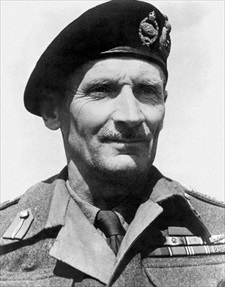MONTGOMERY, BERNARD LAW (1887–1976)

Montgomery saw service in France during World War I, rising to the temporary rank of lieutenant-colonel. In 1919 he briefly commanded a battalion in the British Army of the Rhine. Later he saw service in India and in the British mandate of Palestine, where, promoted to major general in October 1938, he put down an Arab revolt. Deployed to Belgium as part of the British Expeditionary Force in 1939, he skillfully managed to withdraw his division to Britain with minimal casualties during the Allied evacuation at Dunkirk (late May–early June 1940).
Following the “Miracle of Dunkirk,” Lt. Gen. Montgomery commanded forces south of London, making a name for himself by insisting on continuous training and on high levels of physical fitness for both officers and enlisted men. In 1942 he was posted to North Africa, where British Prime Minister Winston Churchill placed him in command of the Eighth Army. From August 1942 the Eighth Army fought in the Western (Libyan) Desert, besting Erwin Rommel’s Afrika Korps in the Second Battle of El Alamein (October 23–November 4, 1942)—a major turning point in the Western Desert Campaign because it ended Axis hopes of occupying Egypt, taking control of the Suez Canal, and gaining access to the Middle Eastern and Persian oil fields. Montgomery’s Eighth Army and U.S. forces, which had landed in Northwest Africa in November 1942 under the overall command of Gen. Dwight D. Eisenhower (Operation Torch), overwhelmed crumbling German and Italian resistance in Tunisia in May 1943.
Montgomery subsequently commanded the British Eighth Army in Sicily (Operation Husky) and Italy (Italian Campaign) before being given responsibility for planning the D-Day invasion in Normandy, France. He was in command of all Allied ground forces (U.S., British, Canadian, and Free French) during Operation Overlord, from the initial landings on June 6, 1944, until after the Allies were firmly established on French soil two and a half months later (Battle of Normandy). Promoted to Field Marshal, Montgomery continued in command of the Twenty-First Army Group (mainly British and Canadian armies) in Northern France, Luxembourg, Belgium, the Netherlands, and Germany from June 1944 till the end of the war in Europe in 1945. On May 4, 1945, he accepted the surrender of German forces in Northern Germany, Denmark, and the Netherlands for the Allies.
After the war Montgomery became the Commander-in-Chief of the British Army of the Rhine, the name given to the British Occupation Forces, and served as the British member on the Four Power Allied Control Council, which was the military occupation governing body of the U.S., British, French, and Soviet occupation zones in Germany.
![]()
BBC Presentation: Rommel’s Afrika Korps vs. Montgomery’s Eighth Army, North Africa 1942
![]()

 History buffs, there is good news! The Daily Chronicles of World War II is now available as an ebook for $4.99 on Amazon.com. Containing a year’s worth of dated entries from this website, the ebook brings the story of this tumultuous era to life in a compelling, authoritative, and succinct manner. Featuring inventive navigation aids, the ebook enables readers to instantly move forward or backward by month and date to different dated entries. Simple and elegant! Click
History buffs, there is good news! The Daily Chronicles of World War II is now available as an ebook for $4.99 on Amazon.com. Containing a year’s worth of dated entries from this website, the ebook brings the story of this tumultuous era to life in a compelling, authoritative, and succinct manner. Featuring inventive navigation aids, the ebook enables readers to instantly move forward or backward by month and date to different dated entries. Simple and elegant! Click 











